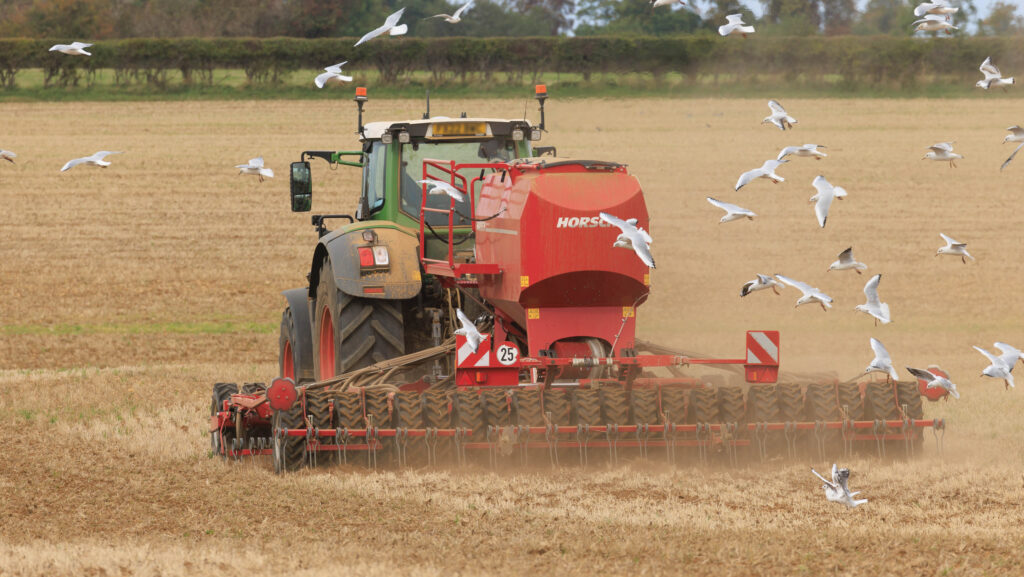Farmland loss puts UK food security at risk, study warns
 © Tim Scrivener
© Tim Scrivener The UK is on course for a sharp decline in food self-sufficiency unless urgent steps are taken to rebalance land use, food production and environmental goals, a new study has warned.
The report, UK Food Security – Outlook to 2050, warns that up to 23% of the country’s farmland could be lost to competing land-use demands by mid-century – including housing, solar energy, tree planting and carbon sequestration – dramatically reducing the nation’s ability to feed itself.
Led by former NFU and Country Land and Business Association (CLA) chief economist Dr Derrick Wilkinson, and published by the think-tank Science for Sustainable Agriculture, the report uses advanced artificial intelligence forecasting to model land use and food production scenarios through to 2050.
See also: UK Treasury dismisses threat to food security from IHT plans
It draws on 25 years of official UK government data and finds that despite a 15% rise in food yields per hectare since 2000, population growth and less farmland have cut per capita food output by 5% and reduced self-sufficiency in primary agricultural products by 12%.
Without urgent policy change, UK food production could fall by more than 32%, and on a per capita basis by 39%, by 2050.
This would increase reliance on food imports by up to 260%, compared with current levels, exposing the country to price volatility and supply chain risks – particularly for low-income households.
“We are struggling to keep up with farmland losses,” said Dr Wilkinson.
“Yield improvements are essential if we are to meet net-zero and biodiversity goals without jeopardising food security.
“Food security is national security – it’s time for policy to reflect that.”
Farmland in the UK has already shrunk by 771,000ha (4.4%) since 2000. Under current policy trajectories, a further 835,000ha could be lost by 2050.
If all government land use and climate policies are implemented in full, nearly 4m hectares – almost one-quarter of UK farmland – could disappear.
Most of this loss would affect high-value arable land, leaving the UK increasingly dependent on global markets to feed a population expected to reach 75-80m by 2050.
The report calls for co-ordinated, cross-government action to protect food security by:
- Boosting productivity on remaining farmland through science and innovation
- Shifting policy towards “land sparing” (high-yield farming on productive land), rather than “land sharing” practices that reduce yields
- Aligning agricultural, environmental, energy and trade policies.
Industry reaction
NFU president Tom Bradshaw said farmers manage land for food, nature, carbon, and support a agri-food sector worth £150bn to the economy, employing more than 4m people.
“To maintain this, we need policies that safeguard our most productive agricultural land and give farmers the confidence to invest in sustainable practices while producing food for 70m people,” he said.
“A multifunctional land strategy and clear targets for British food production are essential.”
Tenant Farmers Association chief executive George Dunn warned that current government policy is “doing serious damage to our productive capacity” and risks displacing tenant farmers in favour of schemes that deliver little real benefit.
“The government must stop incentivising landlords to remove land from the tenanted sector into vanity projects,” he said. “We need a more systematic approach that balances food, environmental and energy security.”
CLA deputy president Gavin Lane agreed that “protecting farmland is vital”, but said flexibility is needed to reflect climate, farming systems and societal needs.
The authors conclude that safeguarding UK food security while meeting net-zero and environmental goals will require tough trade-offs – and a clear national strategy that puts food production on equal footing with climate and nature targets.
Defra hits back at farmland and food fears
Defra has rejected concerns that government land-use policies pose a threat to UK food security, describing the report’s conclusions as a “self-professed ‘worst-case scenario’”.
A spokesman for the department said: “We take concerns of this nature very seriously, which is why we are publishing the most sophisticated land-use data ever gathered to empower farmers and ensure land is used intelligently.
“Our aim is to avoid anything close to this so-called ‘worst-case scenario’.”
The government is preparing to publish a Land Use Framework, which Defra says will offer a cross-government strategy to balance competing demands for food, nature, housing and infrastructure.
It is expected to include tools to safeguard the most productive agricultural land and identify the best areas for nature recovery.
Defra says the UK currently produces 65% of its food needs, and 77% of what it can grow or rear domestically, underpinned by strong trade routes and growing support for farmers through extended visa worker schemes and the Sustainable Farming Incentive.
The spokesperson added that the government has secured a record £11.8bn for nature-friendly farming and food production this parliament, with £2.7bn a year committed through the Spending Review in June.
